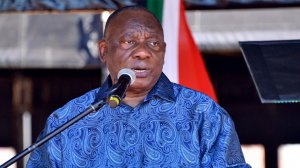For Creamer Media in Johannesburg, I’m Thabi Shomolekae.
Making headlines: Ramaphosa says world cannot ignore atrocities in Gaza as it did the Rwandan genocide; Eskom defends pollution record, saying it’s spending billions; And, World Bank says sub-Saharan Africa growth not enough to dent poverty
Ramaphosa says world cannot ignore atrocities in Gaza as it did the Rwandan genocide
President Cyril Ramaphosa noted today Monday that with the advent of 24 hour news, the proliferation of social and community media and the speed with which information is disseminated in the digital age, it is nearly impossible for mass atrocities to occur under conditions of secrecy.
In his weekly letter to the nation, Ramaphosa pointed out that several western countries, some of which had a presence in Rwanda in 1994, later said they were not aware of the extent of the killings during the genocide.
He said ignorance cannot be claimed about what is happening in Gaza as, unlike in Rwanda in 1994, the atrocities are being televised, written about, tweeted and live-streamed.
Ramaphosa noted that it was now close to six months since Israel unleashed a campaign of violence on the people of Gaza in response to the attack on Israel by Hamas.
Eskom defends pollution record, saying it’s spending billions
South Africa’s State power utility, stung by reports about the health impacts of emissions from burning coal, said it’s spending billions of dollars to reduce them and has an ambitious target to reduce output of one of its most dangerous pollutants.
Eskom said it’s committed to a R67-billion plan to cut emissions and by 2035 aims to reduce its output of particulate matter by 70%.
Last week, the Helsinki-based Centre for Research on Energy and Clean Air said a government proposal to delay the closure of the plants in a bid to bolster energy security could result in the death of tens of thousands of people from respiratory diseases, heart attacks and strokes. Eskom, which is based in Johannesburg, said it has already shut down one coal-fired plant and a number of units at others.
Greenpeace said in a report last month that the company operates five of the world’s biggest single source nitrogen-dioxide emission sites and two of the worst sulphur-dioxide sites. Both gases cause a range of at times fatal ailments. Eskom has questioned the methodology used by Greenpeace.
And, World Bank says sub-Saharan Africa growth not enough to dent poverty
Economic growth is set to rise for the next two years in sub-Saharan Africa, but not enough to make a significant dent in poverty on the continent, the World Bank said in a report today.
The region's economy is set to expand 3.4% this year and 3.8% in 2024 as falling inflation boosts private consumption, up from 2.4% in 2023, the World Bank said in its biannual Africa's Pulse report.
Many countries in sub-Saharan Africa were hit hard by the shocks of Covid-19 and Russia's war in Ukraine, which pushed up inflation at the same time as rising global interest rates made borrowing prohibitively expensive. Drought and conflict have also affected swathes of the region.
"Growth is set to bounce back in sub-Saharan Africa but the recovery is still fragile," the report said. "The pace of economic expansion in the region remains slow and insufficient to have a significant effect on poverty reduction."
"Per capita GDP growth of 1% is associated with poverty reduction of only 1% in the region, compared to 2.5% in the rest of the world."
That’s a roundup of news making headlines today
Don’t forget to follow us on the X platform, at the handle @PolityZA
EMAIL THIS ARTICLE SAVE THIS ARTICLE ARTICLE ENQUIRY
To subscribe email subscriptions@creamermedia.co.za or click here
To advertise email advertising@creamermedia.co.za or click here










